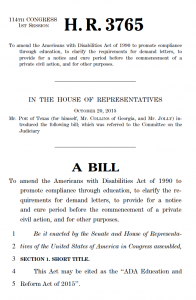 On July 7 H.R. 3765, the ADA Education and Reform Act of 2015, passed out of the House Judiciary Committee. H.R. 3765 is one of several pending ADA reform bills targeting “drive-by” or serial litigants. They share a common approach, requiring that plaintiffs give notice before filing suit so the problem can be fixed. They also share a common reaction from the disabilities and business communities. Disability advocates vehement oppose the bills while business groups support them.
On July 7 H.R. 3765, the ADA Education and Reform Act of 2015, passed out of the House Judiciary Committee. H.R. 3765 is one of several pending ADA reform bills targeting “drive-by” or serial litigants. They share a common approach, requiring that plaintiffs give notice before filing suit so the problem can be fixed. They also share a common reaction from the disabilities and business communities. Disability advocates vehement oppose the bills while business groups support them.
We’ve blogged about H.R. 3765 before (click HERE and HERE to read the earlier blogs). Our prediction that the bill would go nowhere is proving wrong, but our criticism of the bill’s likely effectiveness hasn’t changed. Serial litigation is driven by cheap standing and the economics of defending a lawsuit in federal court, neither of which will be changed by this bill. There is something in the bill that all sides should agree on – a requirement for more ADA education. Unfortunately, this requirement comes without any funding, so it is unlikely to be effectively implemented. The best way to reduce litigation and help the disabled involves seriously funded education for business and coordination of ADA compliance requirements with the building inspection process at the local level. This would improve ADA compliance before a suit was filed or demand letter sent, and that would have the effect of moving resources from attorneys fees to accessibility. Private enforcement of the ADA through litigation is the most wasteful way to achieve the goals of the ADA, and as long as litigation is the main tool for enforcement the lion’s share of money will go to lawyers instead of improvements in accessibility.

